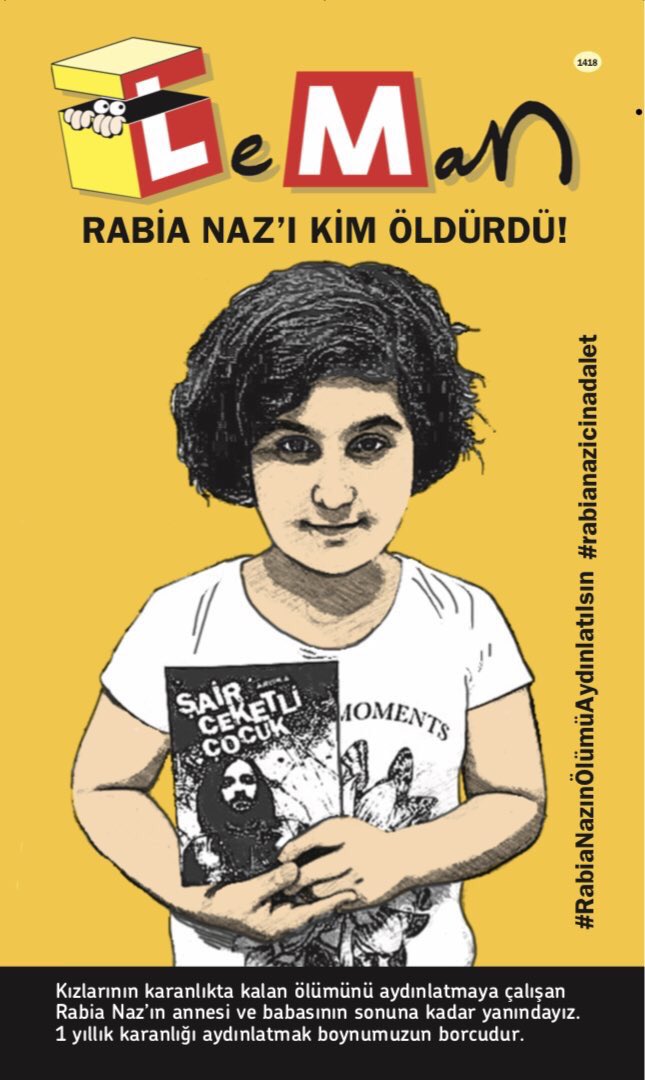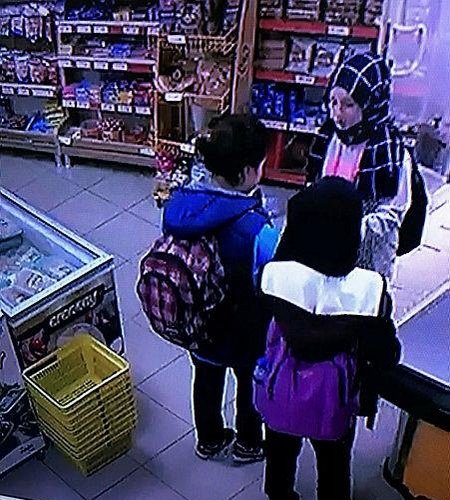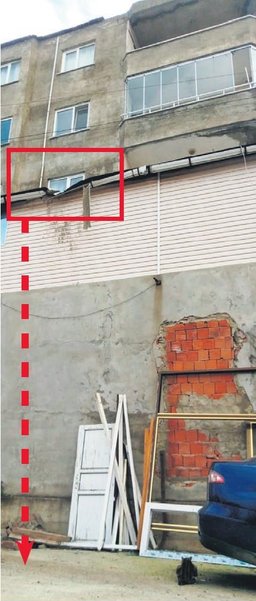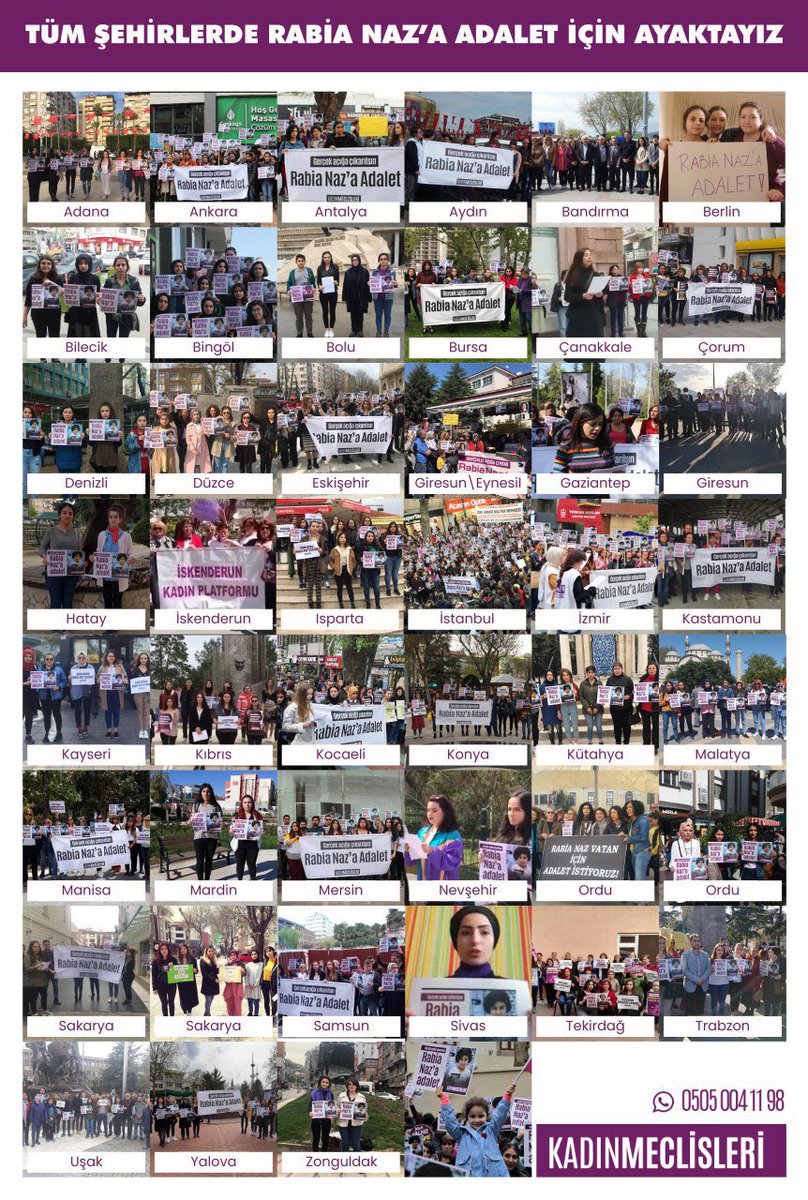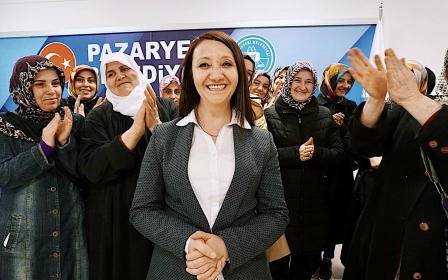'What happened to Rabia Naz?' Turkish girl's death raises accusations of cover-up
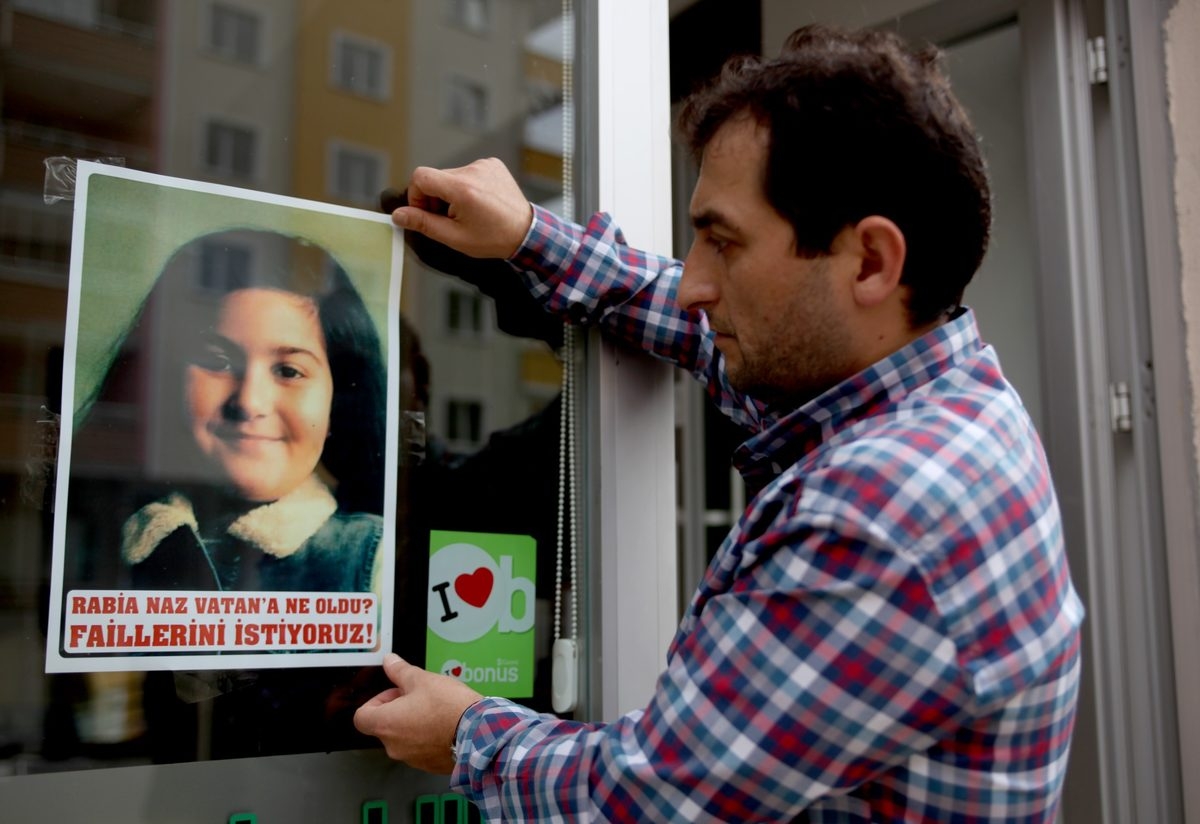
On 27 March, the front cover of Turkish satirical magazine LeMan, which usually features biting caricatures of politicians and celebrities, instead displayed a colourised photograph of a young girl holding a book.
Above were written the words "Who killed Rabia Naz!"
Eleven-year-old Rabia Naz Vatan was found dying outside her family home in the northeastern province of Giresun on 12 April 2018, her left leg hanging by a thread from her body, an artery severed.
The case caused a scandal in Turkey, as accusations emerged claiming that the real causes of her death were covered up.
New MEE newsletter: Jerusalem Dispatch
Sign up to get the latest insights and analysis on Israel-Palestine, alongside Turkey Unpacked and other MEE newsletters
On the occasion of International Women's Day on 8 March, thousands of women carried photos of Rabia Naz alongside other victims of violence against women.
Campaigners have called for a new investigation into the circumstances surrounding her death, which was originally written off by officials as suicide by jumping from the roof of her house.
On social media, politicians and celebrities have repeated calls for a new investigation, while demonstrations were held across the country on 13 April by the Women's Council and the We Will Stop Femicide platform.
Across the protesters' banners, on social media and in newspaper columns, one question was asked over and over again: What happened to Rabia Naz?
Rabia's father, Saban Vatan, has been the most vocal advocate for re-examining the evidence related to his daughter's death.
Vatan told Middle East Eye of his suspicions that his daughter had in fact been killed in a car accident by a nephew of Coskun Somuncuoglu - a political figure who, until 31 March municipal elections, had served as mayor of the Vatans' hometown of Eynesil.
He said that he believed his dying daughter had been taken from the scene of the accident, dragged outside the family's house and the scene staged to appear like a suicide.
"At the place she was found there was no blood, no samples, no fluids that belonged to her," he said.
Vatan also accused Nurettin Canikli, then-MP of Giresun province for the ruling Justice and Development Party (AKP), of collusion in the cover-up.
"This issue is no longer just an issue for Saban Vatan - it is an issue for all of Turkey," said Fidan Ataselim, general secretary of We Will Stop Femicide, who organised protests calling for a new investigation.
"An entire society went over this issue and asked the same question - what happened to Rabia Naz?"
An unconvincing suicide hypothesis
The last time Rabia had been seen was returning home from school, as testified by a number of shopkeepers. When Vatan found his daughter severely wounded outside the family home, however, he said he could not find her school bag.
Vatan rushed his daughter to hospital where she succumbed to her injuries. An initial autopsy report listed the cause of death as "internal organ injury with bone fractures associated with bodily trauma".
A police investigation quickly ruled her a death a suicide.
Following Rabia's death, police would claim that her bag had been found on a balcony below the roof of the house - but Vatan insists it had not been there previously.
Vatan maintained that it was not even possible for his daughter to have killed herself by jumping from the roof of their house due to the building's structural design.
"It is impossible for her to fall from the roof of the apartment, because there is a four-and-a-half metre balcony under the roof," he said.
"They claim that she fell past that balcony and landed on the road."
He pointed out that Interior Ministry technical inspectors attempted to recreate his daughter's alleged leap by throwing a sack of cement weighing as much as Rabia from the roof.
The sack failed to clear the balcony below the roof, smashing a chunk out of the structure on the way down.
Confirming his belief that Rabia was in fact killed in a car accident, Vatan said he had been told by locals that a black Fiat Doblo was seen leaving the area around the time of his daughter's death. Workers at a local car wash also told him that they had only cleaned one car that day - a black Fiat Doblo.
He said he believed his daughter had been initially taken to a nearby barn following the car accident.
"She blacked out as the car hit her, so they brought her to the abandoned barn around our house," he said. "The dust on her was the same as the dust in that abandoned house."
Vatan and his lawyer attempted to gain access to the barn to inspect it, but found out that it had been marked for demolition.
Two forensics reports were prepared following the incident - one by local experts and another by Hacettepe University.
The first one, as described by Giresun's chief public prosecutor, indicated that Rabia's "death may have occurred as a result of the trauma of the general body due to the fall from the height."
The second, carried out by the university's forensic science department following a request by Vatan, suggested she was mostly likely hit by a car.
Vatan's claims initially were met with little attention, until citizen journalist Metin Cihan took up the case and began sharing details on Twitter in December. Soon, the hashtag #RabiaNazaNeOldu (What Happened to Rabia Naz) became a trending topic and major media outlets began to pay attention.
A grieving father detained
But Vatan's fight to obtain justice for his daughter has been fraught.
On 10 April, two days before the first anniversary of Rabia's death, the Giresun Penal Court of Peace ruled that Vatan was to be committed on mental health grounds following a court order, and spend three weeks under observation in the Samsun Mental Health Institution. .
Though he has yet to be transferred to the institution - something he attributed the heavy public scrutiny surrounding his case - it would mark the second such detention in two months.
Vatan was first forcibly sent to an institution - on mental health grounds - on 22 March after a complaint was brought against him by his brother Muhammet.
Muhammet had reportedly complained that death threats were being made against him by Vatan. For his part, Vatan told MEE that his brother had been facing "serious financial trouble" and accused him of taking "blood money" from the men responsible for covering up Rabia Naz's death in exchange for making the complaint.
Following Vatan's first detention, Filiz Kerestecioglu, an MP for the left-wing Peoples' Democratic Party (HDP) raised the issue in parliament, questioning the motives behind the move.
"The detention of the father has raised suspicions that the death of Rabia Naz was deliberately covered up," she said.
A few days later, Temel Karamollaoglu, leader of the small Islamist Felicity Party, directly accused Nurettin Canikli of helping cover up the killing.
"I feel the need to give a name - Giresun MP Nurettin Canikli made an attempt to cover up [the incident]," he said, speaking during a press conference.
"This situation shows the state of justice in the country is pathetic."
Canikli - whose every tweet is now met with a barrage of responses bringing up Rabia Naz - has fiercely denied any involvement in a cover-up, and in April called for a parliamentary inquiry to be launched.
Canikli was contacted by MEE for comment, but had not responded at time of publication.
The case continued to pick up steam, with numerous celebrities and media figures becoming involved.
The Twitter account @RabiaNazaNeOldu features an array of actors, musicians and politicians in videos supporting a new investigation into the case.
"What happened to Rabia Naz? Please let this murder be illuminated!" said model Didem Soydan.
Actor and politician Baris Atay also criticised Vatan's detention, while actor Cansu Firinci warned that her killer would "meet the punishment you deserve, no matter who's protecting you, eventually".
Eventually, on 12 April - one year after Rabia Naz's death - action was finally taken.
The Council of Judges and Prosecutors (HSK) - the Turkish legal system's disciplinary body - announced that it had accepted Vatan's request and was opening an investigation into Rabia Naz's death.
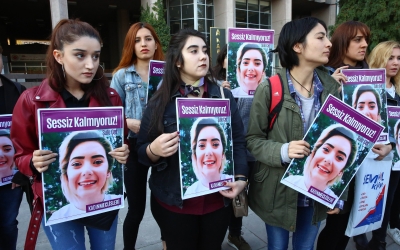
Turkish Justice Minister Abdulhamit Gul announced that he had instructed the HSK to make the Rabia Naz case a "priority".It was also announced that an investigation was to be launched by the Gorele district's chief public prosecutor's office into the police officers who conducted the original examination of the scene where Rabia Naz was allegedly killed. In addition, 60 witnesses would be re-interviewed
"It is our sole aim to proceed in a transparent way and find answers to all questions," he tweeted.
"I've been carefully following the process from the beginning. As a father and minister of justice, I understand the pain of Saban Vatan, and I treat the search for justice with deep respect. My wish is that the result of the investigation is a fair conclusion that will satisfy the conscience.
"We're with the family who wants to know what the truth is."
On 26 April, the Gorele chief public prosecutor's office also announced that new witnesses had been found and that a special team of five people, established by the public security division of the Giresun police department's homicide bureau had been put on the case.
Political damage
Rabia Naz is only one of a number of women and girls who have been the subject of awareness-raising campaigns in the past year in Turkey.
Sule Cet, Aysun Yildirim and Esin Gunes are just some of the names of women whose suspicious deaths - initially written off as suicides - have prompted a wave of anger from feminist campaigners.
According to the campaign group We Will Stop Femicide, 440 women were killed by men in Turkey in 2018. Out of these deaths, they classified 30 percent as "suspicious".
However, Rabia Naz's case has arguably provoked more controversy and had more of an impact than any of the others.
Since her father first began his campaign in April 2018, the local mayor for Eynesil, Coskun Somuncuoglu, lost an election to Ahmet Latif Deniz of the Republican People's Party (CHP), after holding the position since 2004.
Eynesil, a small town of 7,700 inhabitants, had for decades been a right-wing, conservative stronghold in Turkey, but the 31 March election saw the secular centre-left CHP take the town.
Vatan himself had previously been a member and supporter of the AKP - his wife had even been general secretary of the party's Eynesil branch.
Both resigned following their daughter's death, however, and campaigned vigorously to unseat Somuncuoglu, regularly speaking at rallies campaigning for the CHP candidate.
At least one local media outlet attributed the outcome of the election to the anger felt in the town over the Rabia Naz controversy.
For Ataselim of We Will Stop Femicide, the case has proved the power of collective anger to challenge the powerful.
"Individual efforts take you somewhere that is important as what you can do in a common and organised way. Nothing will happen by itself," she said.
"Women from many different sectors participated in our call for action in 45 provinces - social groups that may have a different opinion did the action themselves. Turkey stood up for Rabia Naz."
But despite the election results, Vatan remains disillusioned.
"Our country couldn't pass the justice test, unfortunately. Especially on politicians being involved in the cruelty of children murder cases and cover ups," he said. "That's what people living in Eynesil believe and saw."
"There are around 5,000 voters and we won with 1,000 votes - those votes belong to the mothers."
Middle East Eye delivers independent and unrivalled coverage and analysis of the Middle East, North Africa and beyond. To learn more about republishing this content and the associated fees, please fill out this form. More about MEE can be found here.


